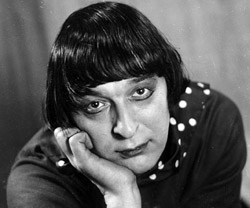“I don’t repeat the life, I reflex it. Circus is not mine, I like theatre, where there is no word, no music. Where there is a man, who creates this music with his body and gesture. I don’t know what this theatre means yet, don’t ask me that. But I like this kind of theatre”.
Leonid Engibarov was a perfect and tragic figure. He had a good trained, impressing body and a kind heart. He created his own circus, a circus that creates a fairy-tale. He was able to bring a philosophy into the amazing and funny arena of circus. Engibarov has never tried to be like anyone, he didn’t like parody. His appearance was lyrical. Engibaroav could do something very surprising: he could watch himself from aside. And it seems that all his life he said to people: “People, don’t hurt each other”. Engibarov entered the Soviet circus and unexpectedly left everyone behind with his impressing appearance and silent philosophical stories. Everyone that saw Engibarov in the arena was impressed with his unexplainable energy. The most important thing for him was to gain fame and be leader in the field he had chosen, he could train himself all day long from early morning till late at night in order to make his appearance ideal. “In the morning I always do the same things that I can do without any difficulties for 10-15 times, and I do the things that I haven’t shown yet for about 50 times”, said Engibarov. A good clown must not only know how to make people laugh, but also be a good acrobat and magician. Besides all these things Engibarov also had the brains. He has rejected good plays many times when he felt that something was not innovative and original. When once someone asked him what happened to the play that he had been preparing for several months he replied: “I have left it aside, let it have a rest, and then later I will consider it with a new fresh approach”. The moment of evaluating the meaning of actions was very important for Engibarov. His actions included several other actions, besides impressing actions he had also important meanings in those. He was a man of circus but he considered himself a pantomime player. When Engibarov was studying at the circus academy of Moscow, Pantomime was not famous and was considered “a strange occupation and training for deaf and dumb people”. However, Engibarov was ready to improve the art of speaking body and find out what his body could do. “Pantomime makes the audience think, because they trust in it and think better of it. When people guess what I want to show them they feel happy. Pantomime is a lively idea”, wrote Engibarov in his notebook. As for idea, it must be clear to people and appreciated. It must be like a shiny discovery. That is why everyone could understand him, because they were all a part of his appearance and understood what he did. This is the most important and difficult thing of pantomime.
Engibarov was afraid of repeating the ideas of other people, that is why when he saw that other clowns were doing his own actions he refused to do them any more. Once when he met his friends he said that he felt pity because his ideas were being stolen. It is evident that Oleg Popov clearly did one of his actions: “Hunting of sunshine”, due to which Popov was declared as “the clown of the sun”.
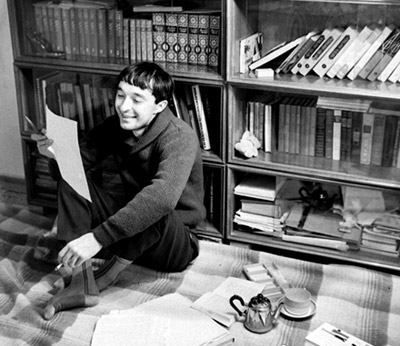 The way to arena was very difficult for Engibarov, he didn’t succeed at first, and his play in the circus of Novosibirsk was a failure. He always looked for something, his findings and victories were not enough for him. Engibarov didn’t use the traditional grease-paint of clowns. He appeared in the stage with his own face, with his philosophical ideas, good mimics and elfin behavior. When looking for a face of appearance he mixed the two famous traditional masks: happy Arlekin and sad Pierro. The appearance of Engibarov was both funny and tragic. The slim body of Engibarov fit with his appearance. His fragile and funny appearance had so many things to give to people, to tell that was always sad. It was sad, because it was always alone and difficult to understand. The final appearance of Engibarov was formed in Yerevan. Circus observer Rudolf Slavski wrote: “Several national characteristic things appeared in his appearance and he became like an elfin and active boy of Yerevan streets”.
The way to arena was very difficult for Engibarov, he didn’t succeed at first, and his play in the circus of Novosibirsk was a failure. He always looked for something, his findings and victories were not enough for him. Engibarov didn’t use the traditional grease-paint of clowns. He appeared in the stage with his own face, with his philosophical ideas, good mimics and elfin behavior. When looking for a face of appearance he mixed the two famous traditional masks: happy Arlekin and sad Pierro. The appearance of Engibarov was both funny and tragic. The slim body of Engibarov fit with his appearance. His fragile and funny appearance had so many things to give to people, to tell that was always sad. It was sad, because it was always alone and difficult to understand. The final appearance of Engibarov was formed in Yerevan. Circus observer Rudolf Slavski wrote: “Several national characteristic things appeared in his appearance and he became like an elfin and active boy of Yerevan streets”.
Engibarov became famous in Yerevan, he was always surrounded by people, many people wanted to meet him and drink coffee or wine with him. Once Engibarov said in one of his interviews: “It is a pity that I don’t know Armenian. I have learned a little bit- how to express my love to girls, use slang and give explanations about my interviews in newspapers”.
When French pantomime artist Marselle Marso met Mesrop Movsisyan, who is the author of the “And he said silently…” film dedicated to Engibarov, said: “I know three great representatives of pantomime: Baster Citon, Charley Chaplin and your Leonid Engibarov. But he is not only yours, he belongs to everyone”.
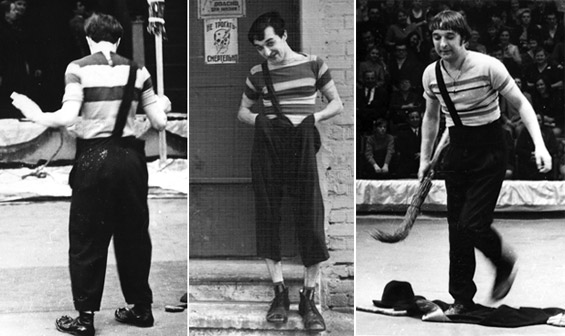
People in the Moscow circus didn’t like him. During a long period he wasn’t allowed to leave for abroad and play there, because he had found himself in a bad situation. But he has never had anti-soviet plays and once he told one of his friends: “It is easier for me to kill a man than to make a revolution”. After his first play abroad Engibarov was given a Grand-Prix prize and due to a Check journalist he was named “a clown with autumn in his soul”. By the way, once when Engobarov was in Czechoslovakia, he crossed the border with Switzerland and called the Embassy of the Soviet Union and asked whether he should go back or not. With this he wanted to prove that he didn’t want to leave his country. Famous clown Youri Nikulin and Oleg Popov were impressed with the successes of the new clown. Many people set obstacles in front of him. It was very painful for Engobarov to remember his losses. He needed to be famous and receive many applauds. He dreamed of serious plays and solo actions. “Clowns fill the time between circus actions, his job is to make these periods interesting for people. People often say that the periods that I work in the arena are the most important actions in the circus, but this is not so. On the one hand I was happy to learn that, but on the other hand I had to leave the circus. My art is more close to solo plays”, said Engobarov in one of his interviews.
And when he learnt that his dream was coming true and that he could already establish his own authorial circus, his heart just stopped, it couldn’t resist this happiness. Slavski wrote: “The authorial circus was the song of this talented clown that was not sang”. He was 37 years old. He was not allowed to use alcohol, but he liked it a lot and couldn’t resist his temptation. He died in the arms of his beloved mother when he said that his heart was burning. His death was the beginning of numerous legends. Some people said that he died in the circus, others said that he was drunk and fell down on the streets of Moscow and people passed by thinking that he was drunk, and then he couldn’t be taken to hospital in time because Brejnev was going to airport and the roads were closed. This is according to Vladimir Visotski. When someone called him and said that his friend Lyonya had died, he silently hung the phone up and said, “Maybe I will die like a homeless dog too”. This is according to the wife of Visotski, Marina Vladimirovna. Later Visotski wrote a poem dedicated to Engobarov and the last sentences read: “The first clown filled his heart with pain, he just didn’t know how much he could resist”.
What happened to Engibarov’s archives?
 Film producer Mesrop Movsisyan visited the apartment of Engibarov in Moscow in 1985 and talked to his aunt Evgenya Babarikina. He brought almost all uniforms of Engibarov to Armenia. “That archive was very big: personal things, clothes, etc. The famous umbrella was also there. I hoped that Engibarov would have a museum in Yerevan. I brought those four big boxes to Armenia and got into trouble. I started from the circus and ended up with the dramatic theatre, but didn’t find a small corner for Engibarov. I gave some things to the circus, where they made a small corner behind the curtains. We applied to the central political board of Soviet Armenia with the director of circus and asked them to give us a corner for Engibarov. At last Hrachya Ghaplanyan agreed to keep those things in the theatre. But after his death no one knows where those things are”, says M. Movsisyan. He has tried to talk to the daughter of Hrachya Ghaplanyan to find out where the archive is, but in vain. He was only informed that the boxes were kept in the archive place of the theatres union building. As for this building, it was known as “artists’ house”, had already been sold and now it is the French Embassy there. Probably when selling this building people thought those were useless clothes and writings and threw the boxes away.
Film producer Mesrop Movsisyan visited the apartment of Engibarov in Moscow in 1985 and talked to his aunt Evgenya Babarikina. He brought almost all uniforms of Engibarov to Armenia. “That archive was very big: personal things, clothes, etc. The famous umbrella was also there. I hoped that Engibarov would have a museum in Yerevan. I brought those four big boxes to Armenia and got into trouble. I started from the circus and ended up with the dramatic theatre, but didn’t find a small corner for Engibarov. I gave some things to the circus, where they made a small corner behind the curtains. We applied to the central political board of Soviet Armenia with the director of circus and asked them to give us a corner for Engibarov. At last Hrachya Ghaplanyan agreed to keep those things in the theatre. But after his death no one knows where those things are”, says M. Movsisyan. He has tried to talk to the daughter of Hrachya Ghaplanyan to find out where the archive is, but in vain. He was only informed that the boxes were kept in the archive place of the theatres union building. As for this building, it was known as “artists’ house”, had already been sold and now it is the French Embassy there. Probably when selling this building people thought those were useless clothes and writings and threw the boxes away.
Mr. Movsisyan remembers what the aunt of Engibarov told him, “Don’t take the clothes of Lyonya with you, you will get yourself into trouble. Lyonya left this world with hurt”. Mr. Movsisyan tells: “I said that Lyonya was such a wonderful person that would not bring any trouble, but she said that it was the same and even being such a wonderful person he would bring trouble for me and advised me not to do so”. But Mr. Movsisyan brought those things to Yerevan. Troubles began just after landing in the airport: at first, all perfume bottles in the boxes broke, and then something bad happened in the family of Mr. Movsisyan. “Everything started to go back. I took the boxes to the editorial of “A1+” TV, but in several days it was dissolved. Then I took it to Ghaplanyan and he died, later the building where the boxes were kept was sold. It was very strange”. According to the aunt of Engibarov there have been a lot of mystical things connected with his clothes. When Engibarov’s friends visited the cemetery and were drinking toasts to him, film producer Rolan Bikovich took a glass and was trying to propose a toast the sky that was clear before that became cloudy unexpectedly and a thunderbolt broke the crystal jug prize of Engibarov in two parts.
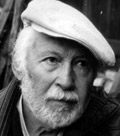 As for the archive of Engibarov that was taken to Armenia, no one knows where it is. Engibarov used to have several stage uniforms, some of which are shown in the arts and literature museum of Moscow now, and one of those uniforms is in the circus of Yerevan. Some things were given to Rudolf Slavski and later he gave those things to one of Engibarov’s fans, Gayane Klekchyan, hoping that one day Engibarov would have a museum in Yerevan.
As for the archive of Engibarov that was taken to Armenia, no one knows where it is. Engibarov used to have several stage uniforms, some of which are shown in the arts and literature museum of Moscow now, and one of those uniforms is in the circus of Yerevan. Some things were given to Rudolf Slavski and later he gave those things to one of Engibarov’s fans, Gayane Klekchyan, hoping that one day Engibarov would have a museum in Yerevan.
 Our newspaper hereby publishes three novels by Engibarov and pictures, which we got from Mrs. Klekchyan and which haven’t been shown yet. As for the other things, Gayane will give them to the pantomime theatre as soon as it has its own building. The art director of the theatre, Jirayr Dadasyan hopes to found a museum of Engibarov one day. “I want to collect all the things because I am sure that those things will be secure here. All things of Engibarov must be kept in the theatre of pantomime, because he was a pantomime”, says he. Far ten years ago he tried to get the writings and other things belonging to Engibarov from Nerses, the brother of interpreter of Czech language Hovhannes Harutyunyan: “Everyone used to call him Czech Hovik, because he had studied at the University of Praha and his Czech was excellent. He was very close to Engibarov, he knew his Czech wife and daughter, he had a lot of things inherited from him. But after the death of Engibarov he didn’t want to give those things to us. I don’t know what happened to those things. There were a lot of novels and writings of Engibarov there, as well as some pictures taken in his childhood”. The daughter of Engibarov was 18 when she visited Armenia in 1980, lived here for one year and then left back for Praha. She had never seen her father. “I think that artists should reject money. If I were offered for instance to get one billion or to get a talent of let’s say a composer, I would agree to get the talent without thinking long. Art can never be compared to ruble, dollar or gold”. Engibarov always wrote his ideas at first and later he made those ideas novels. At the same time, he always changed his place when writing. Let’s say if one day he wrote his novels sitting near a table, the next day he would move somewhere else. Regarding this he wrote in his notebook: “otherwise the novels will not be good”.
Our newspaper hereby publishes three novels by Engibarov and pictures, which we got from Mrs. Klekchyan and which haven’t been shown yet. As for the other things, Gayane will give them to the pantomime theatre as soon as it has its own building. The art director of the theatre, Jirayr Dadasyan hopes to found a museum of Engibarov one day. “I want to collect all the things because I am sure that those things will be secure here. All things of Engibarov must be kept in the theatre of pantomime, because he was a pantomime”, says he. Far ten years ago he tried to get the writings and other things belonging to Engibarov from Nerses, the brother of interpreter of Czech language Hovhannes Harutyunyan: “Everyone used to call him Czech Hovik, because he had studied at the University of Praha and his Czech was excellent. He was very close to Engibarov, he knew his Czech wife and daughter, he had a lot of things inherited from him. But after the death of Engibarov he didn’t want to give those things to us. I don’t know what happened to those things. There were a lot of novels and writings of Engibarov there, as well as some pictures taken in his childhood”. The daughter of Engibarov was 18 when she visited Armenia in 1980, lived here for one year and then left back for Praha. She had never seen her father. “I think that artists should reject money. If I were offered for instance to get one billion or to get a talent of let’s say a composer, I would agree to get the talent without thinking long. Art can never be compared to ruble, dollar or gold”. Engibarov always wrote his ideas at first and later he made those ideas novels. At the same time, he always changed his place when writing. Let’s say if one day he wrote his novels sitting near a table, the next day he would move somewhere else. Regarding this he wrote in his notebook: “otherwise the novels will not be good”.
“Boxing”
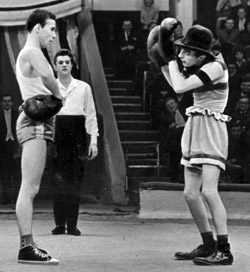 One of Engibarov’s intermediaries was “boxing”. He was fond of boxing because he had gone for box in his youth. He always used this sport in the arena. All clowns have used the difference of partners in their plays: one of them was slim and the other one was tough. And of course people mostly liked the slim one and by chance always the slim partner was the winner. Engibarov had this kind of intermediary too, but in spite of the fact that it was very successful, he didn’t like it and thought something was missing. “When something is not prepared ideally, it seems to me that all actions are not complete and are hanging in the air”, once said Engibarov. He was very successful in “boxing” in Armenia. Once during this action a young lady threw a red rose into the arena and this rose totally changed the planned action. After this rose has been thrown, the slim guy became very strong unexpectedly and beat his partner. Later the strong guy was trying to throw the rose away with his foot but the slim guy was getting insulted and stronger and beating him. It seemed that there was a storm in his soul and this red rose opened the doors of his soul and set the storm free. “How couldn’t I stop myself? This is my rose, this is my love, my heart…”, was saying Engibarov silently. And after saying this he became more active and stronger. In this way the “boxing” of Engibarov became funnier and meanwhile dramatic. On the other hand maybe this rose was not for Engibarov, but for his partner. Maybe he was wrong to think that this was his rose. But there is an answer for this too: the rose belongs to the one who has a fragile heart, can appreciate the beauty and knows how to take care of it. The rose is for the one for whom one rose may be very important, even more important than his own life.
One of Engibarov’s intermediaries was “boxing”. He was fond of boxing because he had gone for box in his youth. He always used this sport in the arena. All clowns have used the difference of partners in their plays: one of them was slim and the other one was tough. And of course people mostly liked the slim one and by chance always the slim partner was the winner. Engibarov had this kind of intermediary too, but in spite of the fact that it was very successful, he didn’t like it and thought something was missing. “When something is not prepared ideally, it seems to me that all actions are not complete and are hanging in the air”, once said Engibarov. He was very successful in “boxing” in Armenia. Once during this action a young lady threw a red rose into the arena and this rose totally changed the planned action. After this rose has been thrown, the slim guy became very strong unexpectedly and beat his partner. Later the strong guy was trying to throw the rose away with his foot but the slim guy was getting insulted and stronger and beating him. It seemed that there was a storm in his soul and this red rose opened the doors of his soul and set the storm free. “How couldn’t I stop myself? This is my rose, this is my love, my heart…”, was saying Engibarov silently. And after saying this he became more active and stronger. In this way the “boxing” of Engibarov became funnier and meanwhile dramatic. On the other hand maybe this rose was not for Engibarov, but for his partner. Maybe he was wrong to think that this was his rose. But there is an answer for this too: the rose belongs to the one who has a fragile heart, can appreciate the beauty and knows how to take care of it. The rose is for the one for whom one rose may be very important, even more important than his own life.
Hooking a girl
 In 1965 photographer Herbert Baghdasaryan was making a photo reportage about Leonid Engibarov (currently Herbert Baghdasaryan heads the “Photolur” agency). In order to make the photos more real and fresh Engibarov asked the photographer to go t0 the nearest park. And in Komaygi park he made an extemporization. Engibarov invited a girl to that park with him whom he didn’t know and who worked at the circus too. Engibarov made a new act called “hooking a girl” and for playing this he needed a female partner. Engibarov had a long scarf on his neck, which he used as a hook and threw to the girl, later after hooking the girl they went off holding the scarf together. After hooking the girl the face of the girl looked silent, and the face of Engibarov looked proud and satisfied. It seemed that he was saying, “I did it”. Later this act was not played any more and only Herbert Baghdasaryan had it. Herbert Baghdasaryan tells, “I was too young and Engibarov was helping me by offering different positions. He had a southern character and northern upbringing and was a very confidential person. In order to take the photos of his place we had to make a real investigation to find out where he lived. Engibarov escaped from extra attention”.
In 1965 photographer Herbert Baghdasaryan was making a photo reportage about Leonid Engibarov (currently Herbert Baghdasaryan heads the “Photolur” agency). In order to make the photos more real and fresh Engibarov asked the photographer to go t0 the nearest park. And in Komaygi park he made an extemporization. Engibarov invited a girl to that park with him whom he didn’t know and who worked at the circus too. Engibarov made a new act called “hooking a girl” and for playing this he needed a female partner. Engibarov had a long scarf on his neck, which he used as a hook and threw to the girl, later after hooking the girl they went off holding the scarf together. After hooking the girl the face of the girl looked silent, and the face of Engibarov looked proud and satisfied. It seemed that he was saying, “I did it”. Later this act was not played any more and only Herbert Baghdasaryan had it. Herbert Baghdasaryan tells, “I was too young and Engibarov was helping me by offering different positions. He had a southern character and northern upbringing and was a very confidential person. In order to take the photos of his place we had to make a real investigation to find out where he lived. Engibarov escaped from extra attention”.
Prepared by Nune Hakhverdyan
Novels by Leonid Engibarov
Poplar snow
Every year mysterious days come in June. In hot summer it snows. This is the bloom of poplar. It seems that someone is joking, interrupting the usual rhythm of the city and sadly laughing.
Poplar snow…
I love poplar snow, unreal snow, its appearance.
I like it better, better than real snow, like the much more expensive apples painted by Renuar.
Snow, snow, snow. Poplar snow comes in the mornings; it is inexplicable, illogical white snow. It says, “be careful”.
Some may not agree with us and may say, “Who knows what you mean by saying “unreal”, “illogical”?” But this is poplar, it is white, like snow, but at the same time very boring. Do not worry, in several days it will go away, summer will be like summer, then autumn, then winter and…real snow. So what about this?
This is a trial for us made by poplar, a trial whether we are able to see, able to appreciate, for instance the apples of Renuar.
I love poplar snow and always worry when its time comes, the time of fright and trials – not to become old and logical.
The hat
It happened in summer, in one of the passages of the Marina grove. Yellow light was hardly being noticeable through the leaves of elder-berry.
In one corner of the yard some were playing, and in the other corner some were discussing a TV program… and there was a hat on a bench not far from the poplar, a gray ordinary hat.
The hat was noticed first by a woman.
In our country there is a woman in each yard, who always notices things first.
“No,”, she thought, “this is not by chance. Wow! Probably THESE are joking. It is time already to discover them”.
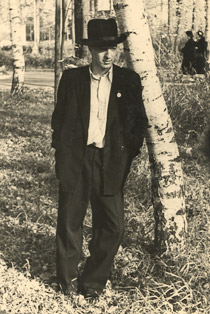 At that time, one of THOSE came up and looked at the hat. He wanted to approach, but stopped when he saw his neighbor. Maybe THESE are joking. So what? Am I stupid to tease? O, she is standing and doesn’t want to take it, maybe there is something under it, so what if I take it and?!
At that time, one of THOSE came up and looked at the hat. He wanted to approach, but stopped when he saw his neighbor. Maybe THESE are joking. So what? Am I stupid to tease? O, she is standing and doesn’t want to take it, maybe there is something under it, so what if I take it and?!
The third one to approach the place was a little bit woozy. He directly went up to the hat, because why not?
– Oh! – said the first two ones and thought that a green light had appeared in the head of the third person.
“Of course”, he thought, “they want to check me up, so I will stand here and watch”.
And he started to watch it.
– What, what, what? – said another man who was very nervous.
They made him calm down at once.
– Hey, can’t you see?
“O”, thought the one that was nervous not understanding what the matter was.
At that time the one that was a little bit woozy wanted to leave, but he was stopped:
– Hey! Are you leaving? Are you leaving the responsibility on us?
Then another man appeared, the fifth one, who always agreed on anything with the majority. He understood what was lying under the hat!!! Oh-o-o!!!
– Who knows!
– Oops, later I will have to prove!
– Always everything happens like this!
– I am not that stupid!
Then someone entered the yard with a book in his hands, walked a little bit thoughtfully, and not asking anything approached the hat and…
There was nothing under the hat. It was just a hat, and the man put it back.
– Hey you!!! – cried the others and ran to him, and he was not able to ask them what the matter was before the other could make him stop showing his intelligence.
– When everyone had already run away, he was sitting on the bench in confusion and the hat was in his hands tore into shreds. They had torn it in order not to worry much… In other words, you know why.
Then an intelligent man who had left his hat on the bench because it was very hot came out of the new house in front of the bench and took the last man to the 14-th police department.
The king
I took bold to come to the circus one more time in order to ask the sad king, the king of clowns how he manages to make people cry because of laughing much and smile through tears.
I entered the circus when he was doing his best action.
The huge hall of the circus was full of people and they were all laughing. There were bubbles under the big top.
I have also seen bad clowns, when the laugh spreads out of the front doors, moves to the café and smoking rooms and stays there.
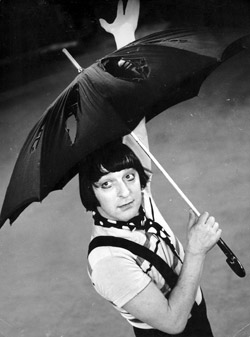 But that day people were misfortunate and sad by throwing wet flowers to the legs of the sad king. He took the flowers, but he later gave all the flowers to people again and left only the tears, the tears that were left on the leaves of flowers… those were tears of happiness. Later people took these flowers home together with the smiles and happy mood from the circus and put it in water. Of course, everyone thought the water of these flowers was just water, but we know what it is.
But that day people were misfortunate and sad by throwing wet flowers to the legs of the sad king. He took the flowers, but he later gave all the flowers to people again and left only the tears, the tears that were left on the leaves of flowers… those were tears of happiness. Later people took these flowers home together with the smiles and happy mood from the circus and put it in water. Of course, everyone thought the water of these flowers was just water, but we know what it is.
When the play was over, I went to cloakroom of the king, the sad king. He took off his clown mask, which he had put on in order to not gasp under the laugh of people. Later he answered to my question concerning how he could do his funny and sad plays: “Now I am making a new funny story, during which people will remember the fresh air of summer mornings, the white snow of January and the smell of autumn, they will see the speed of rabbits, the wise grace of foxes, the wisdom of little black forest snakes which remain anonymous”.
He took a breath and added, “And please don’t ask me how it is done because you know how fragile snowflakes are, how fearful rabbits and foxes are and how fast black snakes can disappear, and it will be pity, because no one knows how those snakes are called”.
I went out of his cloakroom on my tiptoes and closed the door silently.

